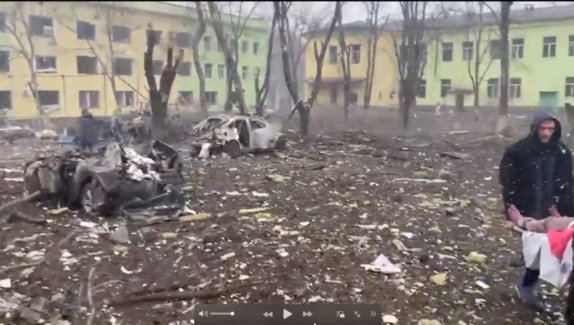'Because things don’t appear to be the known thing; they aren’t what they seemed to be
neither will they become what they might appear to become.'
The trouble with that is that our attention is constantly distracted. We see terrible scenes but barely absorb them before (perhaps mercifully) the camera has moved on.
Anyway, this scene that creates this still image, is rather hidden in the video, which generally pans around the courtyard of the Maternity and Children’s Hospital in Mariupol, Ukraine. Indeed, most of the photographer’s attention is on several burning wrecks of cars and this sad figure just appears to the side, walking slowly with a body in wheelbarrow. I don’t know if the body is alive or dead – I assume the former from the care being taken with the sheets, but within such a tragic scene it hardly seems to matter.


I do recall this and other disturbing scenes of the maternity and children’s hospital in Mariupol, including the images of two bloodied pregnant women brought out on stretchers. Sadly, as horrific as those scenes were, they seem now to pale in light of what’s left by way of devastation in the town of Bucha. I’m left wondering what such images say about anonymised, wartime behaviour and ‘the other’ is dehumanised.
ReplyDelete'The trouble with that is that our attention is constantly distracted.'
ReplyDeleteToday, we need to stop to absorb our world. This was not the case in times of old, nor is it the case in more remote societies today. There was a proverb, now little known (I don't find it on Google): 'You can’t sleep if your neighbour doesn’t eat.'
Our attention is now 'constantly distracted'. Not only that, but if (so to speak) our neighbour doesn't eat, our impressions are merely mediated or abstracted. I wonder what is lost in the conversion. Somebody must have the answer to that. I would estimate 90% plus.
How then does one live in this new world?